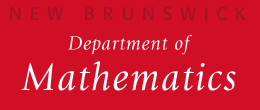The following information is intended for both teaching assistants and part time lecturers conducting recitations for the Rutgers, New Brunswick Mathematics Department.
Official Duties
Recitation instructors should conduct their classes according to the directions of the lecturer in charge of their course. Recitation instructors are required:
- To attend the announced course orientation at the beginning of the semester, if requested to do so by the lecturer or course coordinator, and to discuss with the course lecturer, before the first class, how the course will be run.
- To conduct their classes for the full amount of scheduled time--either 55 minutes or 80 minutes, depending on the course--during each week of the term, including the first week, even if the first recitation comes before the first lecture;
- To prepare assigned homework problems in advance of recitation;
- During recitation,
- To discuss assigned problems and answer other student questions;
- To assign and collect homework, and/or administer quizzes, at the direction of the lecturer;
- To maintain attendance records, if requested to do so by the lecturer.
- In certain courses, to conduct workshops--that is, supervise group work by students on special problems;
- To assist with proctoring and grading, by:
- Grading weekly quizzes, homework, and/or workshop problems at the direction of the lecturer, and keeping systematic records of the grades;
- Helping to proctor midterm and final exams;
- Assisting the lecturer to grade midterm exams;
- Assisting in grading finals; this may, depending on the course, involve assisting the lecturer directly, or participating in an all-day common grading session held after the common mathematics finals;
- To hold office hours for at least 80 minutes (more if teaching more than three recitations and student demand warrants) at established times each week.
- To conduct the student evaluations (Student Instructional Rating Survey) near the end of the term.
- A major purpose of a recitation is to go over homework problems, so that much of the discussion is usually student driven. However, if students do not come forward with enough questions, the recitation instructor should choose and present additional homework problems, and/or review material in other ways, to make up a full-length class.
- If the first recitation of the semester meets before the first lecture, the recitation can be used to review material from prerequisite math classes. The recitation instructor should discuss with the lecturer what material to treat.
- A recitation instructor who is unable to meet a class for any reason, including illness, must inform the Undergraduate Mathematics Office as soon as possible. The students need all the instruction they can get, and we do not cancel recitations (or lectures). For more details on how to deal with conflicts (including emergencies) interfering with any of your responsibilities, see this important document.
How To Be An Effective Recitation Instructor
Before classes start:
Establish some reliable form of regular communication with the course lecturer, using e-mail or telephone.
Weekly in-class activities:
Here is a suggested agenda for running a typical recitation section. Your own recitation should include all or most of these activities, depending on the instructions given you by your lecturer.
- Return graded homeworks and quizzes from last week, as appropriate.
- Answer any questions about course mechanics, such as office hours, exam schedules, review sessions. etc.
- Discuss answers to last week's quiz.
- Answer questions on material presented in previous lectures.
- Discuss homework problems.
- Administer a quiz (at the instruction of the lecturer).
Weekly pre-class preparation:
- Grade quizzes or homeworks from last week. Keep an accurate record of all grades, since these will be a component of the cumulative average used in computing final grades.
- Discuss current course status with the course lecturer and provide him or her with feedback on student performance.
- Prepare homework solutions, text review, and quiz material for class.
- Keep established office hours.
Workshops:
If you are teaching certain calculus courses, part of your recitation section may be devoted to a workshop, in which groups of three or four students work cooperatively on a set of problems, supplied to you by the lecturer, which you distribute to them. During the succeeding week students then individually write up one of the problems, and turn in this write-up at the next recitation. Running a successful workshop involves:
- Making sure that the students form groups of appropriate size and that all students belong to some group;
- Encouraging the students in each group to talk to one another about the problems and to keep working reasonably steadily;
- Giving hints to groups that are stuck, without solving the problems for them;
- Announcing at the end of the workshop which problem is to be handed in next week.
If you have never conducted a workshop before it is a good idea to discuss the procedure thoroughly with your lecturer, with an experienced recitation instructor or teaching assistant, or with some other faculty member of the mathematics department. You might ask one of these people to observe your own workshop, or arrange to observe a workshop conducted by some experienced instructor.
Problems:
Problems with course attendance, unruly students, suspected academic
dishonesty, etc. should be discussed with the course lecturer, the course
coordinator, the head TA, or the undergraduate vice chair, as available.
As mentioned above, instructions for dealing with emergencies that
interfere with any of your own responsibilities are found in
this important document; and we do not cancel recitations until all
alternatives have been exhausted.








